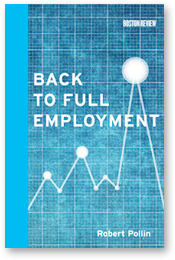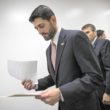Maybe, just like in the late 1970s, we are at a crossroads in economic history, and it’s time not only to argue about policies and programs, but also to revisit the assumptions underlying our current economic regime.
In the 1970s, the mainstream story goes, the economy was broken. The Keynesian paradigm that had shaped economic policy since the end of World War II held, as one of its central tenets, that inflation and unemployment move in opposite directions—if unemployment is high, then inflation is low; if unemployment is low, then inflation is high—and this basic principle allowed the Federal Reserve to help manage the economy and keep unemployment down. That is, until inflation and unemployment both rose together. For years, the Fed had targeted unemployment, lowering the interest rate to try to stimulate the economy to create jobs. With inflation and unemployment rising in tandem, that didn’t work. So in 1979, the Fed switched tactics and targeted inflation instead. The result was, at first, skyrocketing unemployment. But inflation fell, and in time, unemployment did, too. Out went Keynesian management of the economy. In came the policies of the free market, and there we have been ever since.
Maybe, just like in the late 1970s, we are at a crossroads in economic history, and it’s time not only to argue about policies and programs, but also to revisit the assumptions underlying our current economic regime
A major casualty of that policy shift was the idea that the government could create the conditions for full employment, or something close to it, and that it should do so, as a policy goal. As the title of his compelling book—Back to Full Employment—suggests, Robert Pollin argues that the time has come for the idea to be brought back to life. It sounds innocuous when he puts it in those terms. And while Pollin–a professor and co-director at the Political Economy Research Institute at University of Massachusetts Amherst–has written extensively on unemployment and low-wage workers in the U.S., here he is taking aim at much bigger game.
It starts with that mainstream story: For Pollin, the move to free market policies was a “global march,” during which, he argues, policymakers “misread the primary cause of high inflation in the 1970s, which was not low unemployment, but the two oil price shocks—the threefold jump in 1973–74 and a similar spike in 1979.” There’s a big implication hiding behind that statement, that maybe Keynesian economics wasn’t broken in the 1970s, but Pollin doesn’t develop it. It’s better that way. He’s not trying to turn back the clock to the economic regime of the post–World War II era; he’s trying to find a way forward.
 The meat of the book is thus some hardheaded policy analysis, outlining why the government stimulus wasn’t as effective as it could have been and how the government could prioritize full employment with the programs it has now. Instead of waiting for the private sector to start hiring, the government could create jobs itself through infrastructure, education, and green economy projects, as well as support to state and local authorities. Monetary policies could include household debt forgiveness, as well as a clever way to get banks to start making loans again by both guaranteeing the loans banks make and taxing banks for hanging onto excess reserves instead of making loans. Longer-term proposals include revamping industrial policy, financial regulations, and deficit control.
The meat of the book is thus some hardheaded policy analysis, outlining why the government stimulus wasn’t as effective as it could have been and how the government could prioritize full employment with the programs it has now. Instead of waiting for the private sector to start hiring, the government could create jobs itself through infrastructure, education, and green economy projects, as well as support to state and local authorities. Monetary policies could include household debt forgiveness, as well as a clever way to get banks to start making loans again by both guaranteeing the loans banks make and taxing banks for hanging onto excess reserves instead of making loans. Longer-term proposals include revamping industrial policy, financial regulations, and deficit control.
The kick doesn’t lie in the details, however, but in a thick thread running through the entire book: that maybe, just like in the late 1970s, we are at a crossroads in economic history, and it’s time not only to argue about policies and programs, but also to revisit the assumptions underlying our current economic regime and assess whether—and how much—they still apply. “Creating decent employment opportunities for everyone,” Pollin writes, “is too fundamental a project to be left to the vagaries either of markets or governments. It is rather the task of an engaged citizenry to figure out how best to combine what is valuable both with markets and governments to create higher standards of well being, fairness, and ecology—i.e., a greater commitment to morality—throughout our society.”
He’s right. You don’t have to be a progressive to think that the current political conversation doesn’t seem quite big enough for the size of the problems the country is facing. And you don’t have to be a political person at all to think that maybe too many people don’t have enough work, or are working too much for too little; that it shouldn’t be so hard for so many people to make ends meet, and maybe we should be able to do something about that.
Brian Francis Slattery is a freelance editor specializing in public policy for think tanks like the U.S. Institute of Peace and the Peter G. Petersen Institute for International Economics. He is also a novelist whose latest book, Lost Everything, recently won the Philip K. Dick award.






0 Comments